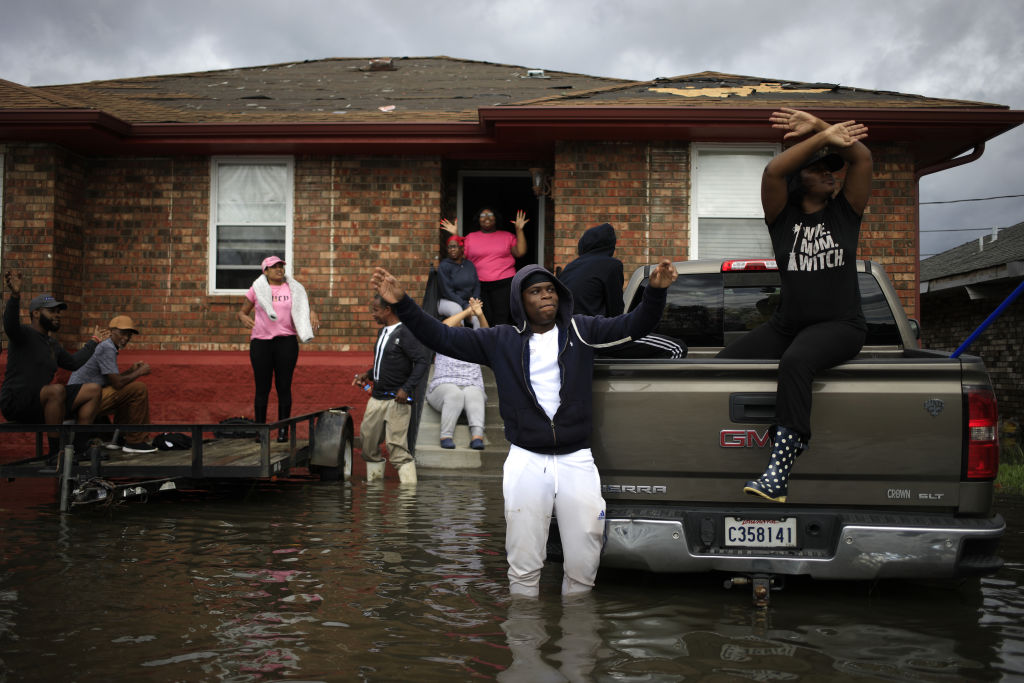
Source: Bloomberg / Getty
Floridians are preparing for the worst as Hurricane Ian continues its destructive path.
The National Hurricane Center has reported that around 9 a.m. the center of Ian was located about 85 miles south-southwest of Orlando and moving at about 10mph. With sustained winds up to 155mph and storm surges forecasted to hit 12-18 feet in some places, the Category 4 storm could cause serious and devastating problems for residents in central and southern Florida.
Gov. Ron DeSantis, who spoke from the state Emergency Operations Center in Tallahassee this morning, fears for the worst and said the storm will have major impacts on the state.
Clearly, this is a very powerful major hurricane that’s going to have major impacts, both on impact in southwest Florida, but then as it continues to work through the state, said DeSantis. “It is going to have major, major impacts in terms of wind, in terms of rain, in terms of flooding, so this is going to be a nasty, nasty day — two days.”
Hurricane Ian is expected to make landfall in Florida at 2 p.m. and the NHC believes the system could bring “catastrophic” flooding to the region.
“It’s going to be historic,” National Weather Service meteorologist Kole Fehling told the Orlando Sentinel.
There is an extra element of fear for Black folks during hurricane season. Even though hurricanes don’t specifically target Black communities, their lasting impact always seems to affect Black people the most.
When Hurricane Harvey flooded Texas in 2017, the southwest Houston neighborhood that suffered the worst flood damage was 49% nonwhite.
In 2005 when Hurricane Katrina devastated southeast Louisiana, African American neighborhoods suffered the most damage.
According to E&E News, four of the seven ZIP codes that suffered the costliest flood damage from Katrina were at least 75% Black.
As climate change intensifies, so will hurricanes which leaves minorities and low-income residents more vulnerable. These populations do not have the resources to sustain themselves after such a massive natural disaster. Many do not have the opportunity to pack their bags for another city and wait out the storm. They also don’t have the income flexibility to rebuild after a storm takes everything.
“Urban flooding is a growing source of significant economic loss, social disruption, and housing inequality,” Texas A&M University flood expert Sam Brody told E&E News.
Many experts point to environmental racism for flooding in the U.S. “disproportionately harming African American neighborhoods.”
Environmental oppression dates back to America’s racist redlining practices in the 1930s. The Great Depression lead to historic housing practices which allowed banks and insurance companies to color-code residential maps of US cities, distinguishing neighborhoods largely based on race. Black neighborhoods were color-coded ‘red’ and deemed hazardous or low value. This also allowed banks to control where Black families lived in cities throughout the country by only allowing them mortgages in ‘redlined’ areas, many of which are still predominately Black and still largely ignored when it comes to infrastructure.
According to Nature.com, Research that tracked assistance from the U.S. Federal Emergency Management Agency to people whose homes were damaged by hurricanes from 2005 to 2016 found that inspectors were less likely to visit areas with more Black residents, denying them a chance to apply for assistance.
Those Black families who were able to apply were denied without reason almost three times as often as white homeowners.
As Hurricane Ian reaches Florida, remember who suffers the most. The destruction from hurricanes is never equally distributed.
SEE ALSO:
Understanding Environmental Racism And Its Effect On Black Americans
What Is Redlining And How Can It Be Solved?
The post Hurricanes ‘Disproportionately’ Harm Black Neighborhoods–It’s Because Of Environmental Racism appeared first on NewsOne.
Hurricanes ‘Disproportionately’ Harm Black Neighborhoods–It’s Because Of Environmental Racism was originally published on newsone.com




